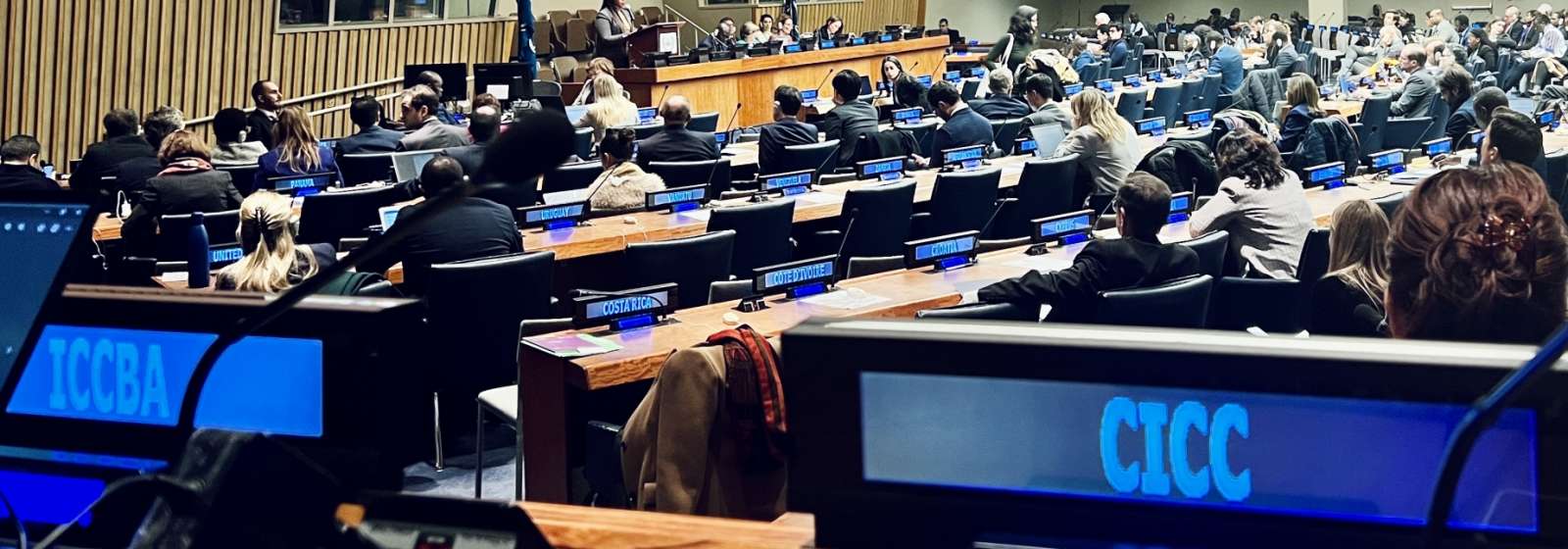
SUMMARY DAY FIVE
ASP22 day five continues with consideration of the 2024 ICC budget, discussions on cooperation, and further negotiations
22nd session of the Assembly of States Parties 2023, United Nations Headquarters, New York, U.S.
8 December 2023
On Friday 8 December, day five of the 22nd session of the ICC Assembly of States Parties opened with a plenary meeting dedicated to the presentation of the Proposed Programme Budget for 2024 of the ICC and the consideration of Audit reports. The ICC Registrar, Osvaldo Zavala Giler, presented the Court’s 2024 proposed Budget. Registrar Zavala Giler further reflected on the environment in which the Court operates, including the need to enhance the security of the institution, the improvements to workplace culture brought on by the Independent Expert Review process, and welcomed Armenia’s ratification of the Rome Statute. The Chair of the Committee on Budget and Finance (CBF)1, Mr. Werner Druml, provided an overview of the CBF’s latest report and recommendations to States Parties for this Assembly session.
The Court has proposed a total annual budget of €196,800,000 million for 2024, which represents an increase of 16% over the 2023 approved budget, while the CBF has recommended States Parties adopt a budget with an increase of 8.7%.
This was then followed by consideration of the audit reports.
The Head of the Independent Oversight Mechanism (IOM), Saklaine Hedaraly, then presented the IOM Annual Report who reflected on the recent ad hoc due diligence processes and design of the permanent due diligence (‘vetting’) process for the election of ICC leaders, to be formally adopted during this session.
Plenary: Cooperation: Reflections on 25 years of cooperation
The ASP22 plenary session on cooperation was divided into two segments. The first segment was a high level panel on the 25th anniversary of the ICC Rome Statute, and the second was a technical segment on arrests. The first panel included interventions from Ambassador François Alabrune, (France), co-facilitator for cooperation, ASP Vice-President Ambassador Bob Rae (Canada), ICC President Judge Piotr Hofmański, ICC Deputy Prosecutor Mame Mandiaye Niang, and ICC Registrar Osvaldo Zavala Giler, who presented reflections on cooperation efforts in the 25 years since the adoption of the Rome Statute, and highlighted their needs to enhance cooperation, as well as their expectations moving forward. Six states took the floor, including Belgium, Argentina, the United Kingdom, the Netherlands, Japan, and Costa Rica on behalf of 48 states parties, calling for the resources necessary to support the work of the Court across all situations before it, including cooperation with the Court. before it, including cooperation with the Court.
The Coalition for the ICC delivered a statement calling on states to make full use of the Assembly strategy to defend and condemn threats and attacks against civil society organizations and human rights defenders who are targeted for their work to advance justice in the Rome Statute system and take steps to strengthen national frameworks for the protection of human rights defenders. The Coalition stated that it looks forward working with the incoming Assembly President and Bureau to continue these essential discussions, including on implementation of the guidelines, with genuine and accessible consultations with those most concerned.
The second segment allowed for the Court, states parties and civil society to share more technical observations and recommendations on promoting effective cooperation regarding arrests of ICC suspects. The speakers included the Minister of Justice of the Central African Republic (CAR) Arnaud Djoubaye Abazene, Special Advisor to the ICC Prosecutor Racine Ly, the Registry’s External Affairs Coordinator Tuomas Salminen, and the director of the International Bar Association’s ICC Program, Kate Orlovsky. The floor was then opened for interventions from participants, including from three states parties, Mexico, Romania and France, and one non-state Party, the United States of America, and on the side of civil society, from Lawyers for Justice in Libya. The session was closed by the co-facilitator for cooperation H.E. Mr. Momar Guèye, Ambassador of Senegal to the Netherlands.
Informal consultations
The afternoon session continued on with the first round of informal consultations on the draft resolution on the Review Mechanism. The text of the resolution is, for the most part, a technical update from the year prior, adopted at the 21st session of the ICC Assembly of States Parties (ASP21). The section which remains to be decided is whether the Review Mechanism will be extended for another year, or its key functions transferred to another entity or subsidiary body of the Assembly.
The first week of the ASP22 session ended with closed consultations among states parties and the Court on the ICC’s 2024 proposed budget.
For everything you need to know about ASP22:
-
Our webpage on the Assembly of States Parties 2023 with all #ASP22 daily summaries, recommendations from civil society and other ASP22 resources.
-
Calendar with all the side events taking place in the margins of ASP22.
-
Follow all the action on our Twitter account: @ngos4justice
